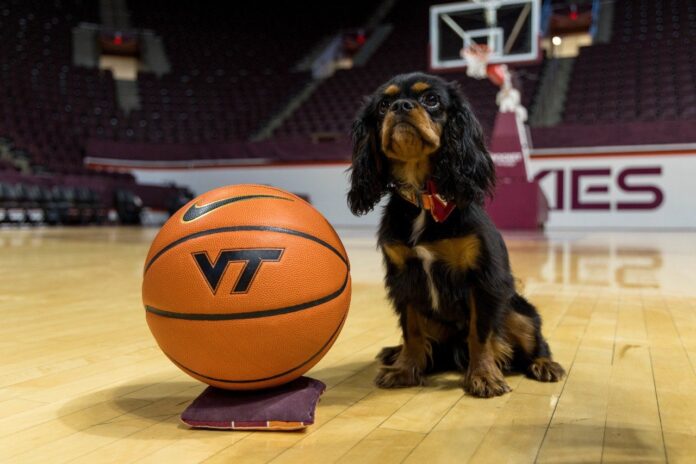He may not shoot hoops like the players his Virginia Tech women’s basketball coach namesake guides, but this Kenny Brooks, a 5-month-old Cavalier King Charles spaniel whose name the family shortens to Brooks, is dribbling his way into the hearts of researchers.
As a key player in a cardiology study at the Virginia-Maryland College of Veterinary Medicine, this charming puppy is helping to unravel the mysteries of heart disease in his breed.
The Kohnke family’s dedication to research
Owned by Dave ’83 and Betsy Kohnke and their two daughters, Katie ’23 and current Virginia Tech student Elise, Brooks plays a crucial role in advancing veterinary science. Betsy Kohnke said, “It’s important that we contribute to research. We may not find out anything from this study, but we also might find out a lot.”
This dedication is seen in their regular six-hour round trips from Richmond for echocardiograms, examining his heart for any indicators of abnormalities.
 Committed Hokies
Committed Hokies
The Kohnke’s previous Cavalier, Frank Beamer, inspired their love for the breed and was the catalyst for their involvement in this study.
The names of both spaniels also reflect the family’s enthusiasm for all things Hokie. “The only way I could bring a Cavalier into a Hokie house was to name him after a VT coach,” Betsy Kohnke said.
“Katie is a fanatic basketball fan and she got us into watching the women’s basketball team,” she said. “And we were like, Brooks, that’s a great name.”
The choice of name reflects not just their love for the sport but also their admiration for the character and sportsmanship of coach Brooks, who led the Hokies to their first Final Four appearance last season.
“I wouldn’t have named my dog after him if I didn’t believe he was a nice man.”
The plight of the Cavalier King Charles spaniel
Cavalier King Charles spaniels, like Brooks, are predisposed to heart conditions, particularly myxomatous mitral valve disease (MMVD). This disease, characterized by the improper closure of the heart’s left valve, typically affects older dogs, many of whom never develop symptoms.
However, in breeds like the Cavalier King Charles spaniel, MMVD can manifest earlier and more aggressively, potentially leading to congestive heart failure and premature death.
Mindy Quigley, clinical research coordinator, likens the heart’s blood-pumping action to a room of people: “The room fills up, then the door opens, and every single person should leave. The door should close completely before a new group of people comes in. If anybody can sneak back in the door, that’s when problems happen.”
Researchers have observed that adult Cavaliers, even those yet to develop the disease, exhibit distinct differences in the shape of their mitral valves when compared to adult dogs of other breeds.
“Naturally, our question then was: Are Cavaliers born with a valve that is differently shaped?” Meciotti said. “Or do they develop these different shapes as they grow? And how does that predispose them to develop the disease compared to other breeds?”

Cavalier research at Virginia Tech
The study, supported by the Veterinary Memorial Fund, is part of an interconnected group of research studies that aims to discover if certain factors could be used to predict an earlier onset of heart disease in Cavaliers.
“We hypothesize that the shape of the mitral valve is playing a role,” said Giulio Menciotti, assistant professor of cardiology, “but it’s been very difficult to look at the valves when they are in a beating heart. However, we can now use a newer technology, the three-dimensional echocardiogram, to analyze the shape of the valve without the need for general anesthesia or other more invasive procedures.”
In a related study, researchers are also examining the cardiac health of Cavaliers over time to determine if dogs with an earlier onset of MMVD are more prone to early heart enlargement compared to other dogs. This could offer valuable insights to assist veterinarians and breeders.
Other factors being examined include age of onset of mitral regurgitation, diet, and changes in left atrial dimensions.

A good experience
Their visits to the Veterinary Teaching Hospital, despite the long drive, have been a good experience for the Kohnkes.
“Dr. [Lezith Desiree] Chavez is one of his doctors and when she came out the first time, she was very professional,” said Betsy Kohnke. “Then when she was bringing him back she started cooing at him and showing him off to everyone. It’s funny to see her, you know, be the serious clinician, and then be very human and silly. I’m glad we’re here.”
Join the study and make a difference
While enrollment for Cavalier puppies is complete, the study is now looking for healthy puppies of other breeds to join the control group. Participating puppies will receive a comprehensive cardiology work-up, including an exam and echocardiogram, at no cost to the owner.
Participating puppies must
- Be between 14 and 20 weeks of age at the time of the appointment
- Have an adult weight expected to fall between 10 to 25 pounds
- Unfortunately, dachshund puppies are not eligible.
- Up to two puppies can be enrolled per dam-sire combination.

Tanner, a 5-month-old Pyrenean shepherd, has a cardiology exam. Photo by Margie Christianson for Virginia Tech.If you have a puppy who meets the criteria and can join this study, register online.
By Marjorielee Christianson

